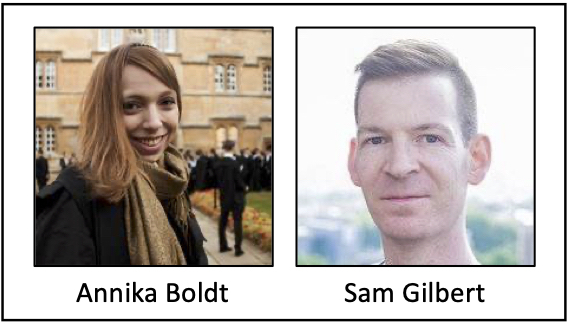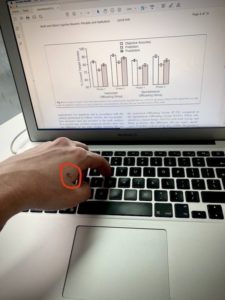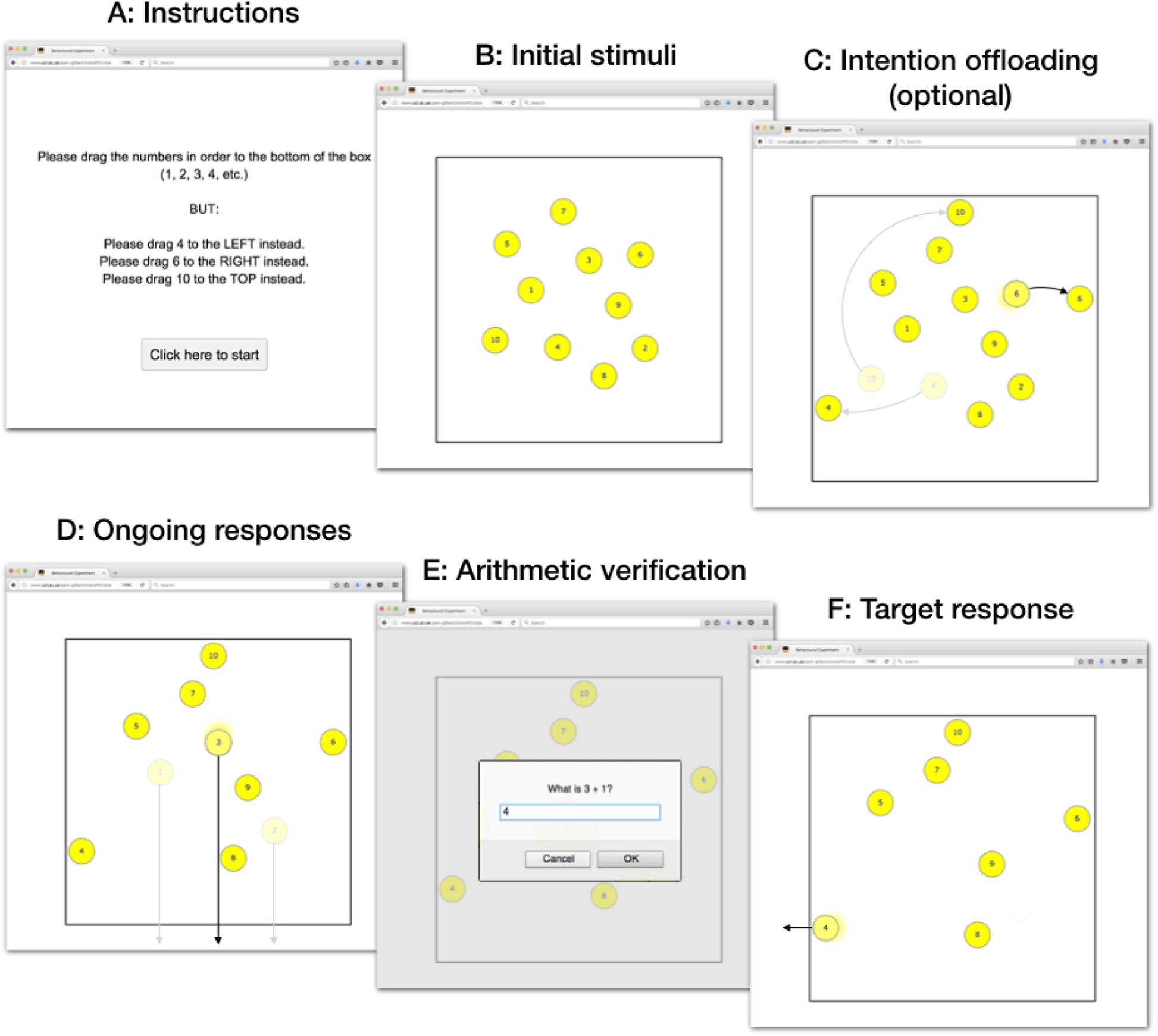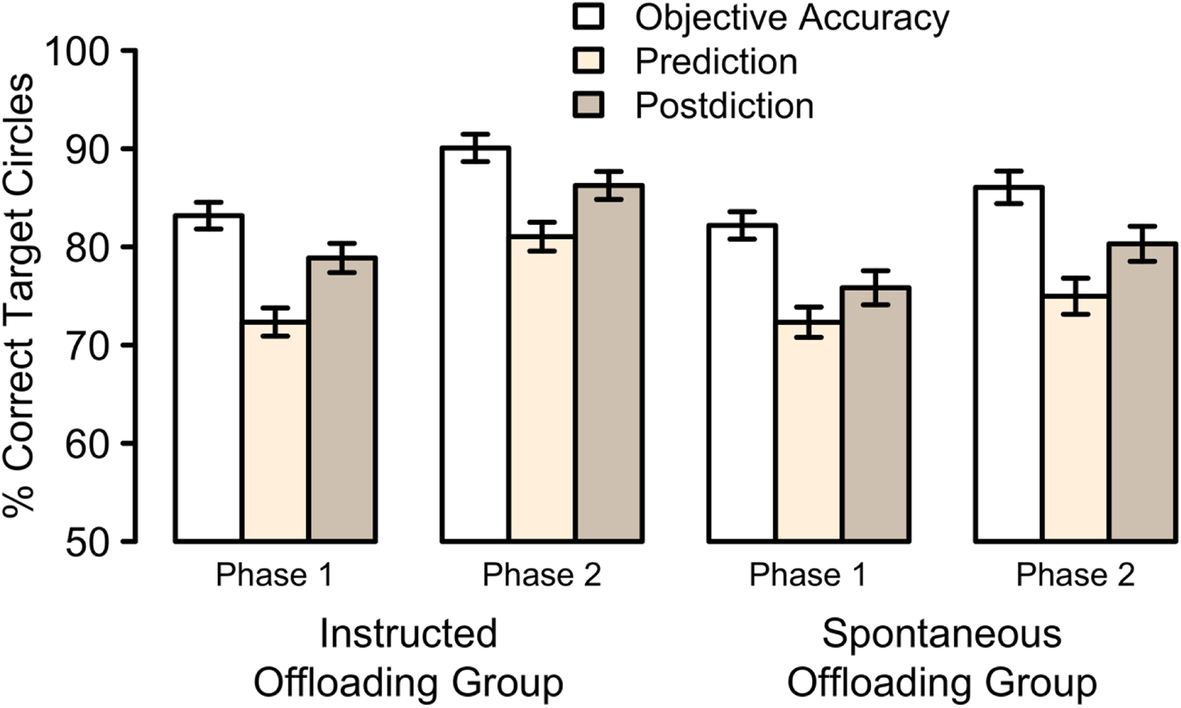I met with Annika Boldt and Sam Gilbert (pictured below) to interview them about their paper recently published in the Psychonomic Society journal Cognitive Principles: Research and Implications called “Confidence guides spontaneous cognitive offloading.”

When we do something to minimize cognitive demands, we are offloading. This is especially common when we write notes and set alerts, for example, as reminders. One time while traveling I was almost off of the train carriage before remembering my luggage that was stored in the overhead bin where I had been sitting. I had to push my way through the disembarking passengers to get my bag in time before the train moved onto its next stop. Now every time I’m on the train with luggage, I draw an arrow on my hand to remind me to get it (as in the picture below). This little bit of offloading does the trick (so far anyway).

Until the Boldt and Gilbert paper, research on offloading has been investigated in a prescribed way. This paper describes the first investigation of spontaneous cognitive offloading. Find out more about it by listening to the interview and reading the transcripts below.
Transcripts
Intro
Seale-Carlisle: You’re listening to All Things Cognition, a Psychonomic Society podcast.
Now, here is your host, Laura Mickes.
Interview with Annika Boldt and Sam Gilbert
Mickes: Hi Annika. Hi Sam. Thanks so much for meeting with me.
Gilbert: It’s a pleasure.
Boldt: Hi. Hello.
Mickes: I was going to be in London and we’re going to meet face to face to have this interview, but because the UK is in lockdown because of COVID-19 we’re meeting online, like the rest of the world.
Are you both in London right now?
Gilbert: Yes, I am.
Boldt: Yeah, me too, yeah, at home.
Mickes: So you are. Right, of course. Not at UCL because all universities are pretty much shut down.
Boldt: I think our building is actually locked.
Gilbert: I’m also at home right now, so if you hear my dog barking then excuse him.
[Laughs]
Mickes: Your dog could be part of the interview.
Gilbert: [Laughs] That I shut him in the next room, so he should be okay.
Mickes: Did you? [Laughs] No wonder why he’s barking.
Right. The purpose of the interview was to learn more about the research that you published in one of the Psychonomic Society journals, but because things have drastically changed before we talk about the paper, do you mind if you guys just briefly tell me how your work life has changed? Yeah, we’re all working from home now and we’re not having our interview face to face, but have you had to make huge adjustments? What do you think the biggest ones are?
Gilbert: I’m spending a lot of time on video calls at the moment and in some ways, I’m surprised at how well it works and in other ways how badly. I find the big kind of committee meetings, that sort of thing, get, get through them pretty fast. So that’s been quite nice. But in terms of the research meetings and the collaborations, I think that’s a bit trickier because, without that good kind of face to face communication, it’s really hard to really kind of think collectively. So you know ups and downs.
Mickes: Yeah, yeah. What about you, Annika?
Boldt: There are conversations that you have in the hallway. Those are just missing. And that’s weird because that’s a, there’s a lot of information exchange that just happens when people bump into each other when they brew themselves a fresh cup of tea or something. And, but yeah, we all getting used to it and luckily we do a lot of online research, so that’s not been affected as much. I’ve got a fresh fMRI dataset, still waiting to be published, so there are no more excuses to not work on that.
Mickes: So waiting to be published? Waiting to be analyzed?
Boldt: Waiting to be published. Yeah. Writing to be written up and submitted.
Mickes: Oh, written. Okay, so good. So now you won’t get distracted by tea time.
Boldt: [Laughs]
Mickes: I think it’s really interesting to see how we’ve changed our working and we all had moved pretty quickly to make that happen.
Are you doing any COVID19 related research?
Gilbert: Not yet.
Mickes: Are you doing anything COVID-19 related or no, just the fMRI write up,
Boldt: That’s what I’m focusing on mostly right now. I’m involved in one project where we had to change plans halfway through coding a task in MATLAB and have to move it online now using PsychoPy and JavaScript, but that’s okay. It gives me an opportunity to polish some coding skills.
Trying to see the silver linings in the situation as much as possible from a work perspective.
Mickes: Yeah. Right.
Should we shift gears and talk about your paper that you last year? Are you ready?
Boldt: Yeah, sure. Absolutely.
Mickes: Okay. This paper you published called “Confidence guides spontaneous cognitive offloading”
What is cognitive offloading?
Gilbert: We would define cognitive offloading as when you use physical aids or physical activity to reduce cognitive demands of the task. So, for instance, instead of remembering your shopping list, writing it down on a piece of paper, but also quite, it’s kind of simple things like here’s an example that Evan Risko has studied quite a lot. Let’s say you have some text which is printed at an angle. Instead of mentally rotating it to read the text, you just shift your head angle and then by moving your head that allows you to avoid the cognitive demands of doing the mental rotation.
Cognitive offloading comes into all sorts of activities, especially today with technologies like smartphones, wearable devices. We have many, many more opportunities to incorporate the external environment into our cognitive processes.
And we’ve just kind of started a line of research trying to understand the processes that lead to cognitive uploading activities and that’s really what the article was about.
Mickes: What was your main research question in this paper?
Gilbert: And I’ve been interested for quite some time in goals and intentions and in particular in the field of prospective memory, how is it that we remember our future planned activities? So remembering to pick up milk on the way home from work, remembering to pass on the message next time you see someone, that kind of thing. And there’s been a lot of really interesting work in the field of perspective memory for the last 20-30 years. But one characteristic of that work is that almost always you ask people to remember to do something and then they’re not allowed to help themselves with any sorts of external reminder or any sort of tool. But we all know from our everyday life that we use calendars, to do lists, diaries, and increasingly now smartphones, things like that.
So about five years ago I started a line of research where we were interested to understand how do people make that decision, whether to just use your own memory to remember something or instead to set a reminder or use some sort of external tool.
And one of the initial findings we had was that one of the key principles is that people use a reminder when they think that their memory will fail, but not necessarily when it actually will fail. So in other words, people’s metacognitive evaluation of their memory abilities tends to be the key factor here that when people think that they’ll struggle to remember, they set a reminder, when they think that they’ll be okay, they don’t. And this implies that that we might be able to get people to make better use of these tools if we improve people’s accuracy of understanding their own memory processes.
But having said that, there was one that kind of shortcoming of the research that we’ve done until this article that we’re discussing today, which is that we always instructed people exactly what they needed to do. So we told them either you can use your own memory or you can set a reminder, and we told them exactly how to set those reminders. But in everyday life, of course, we don’t get an instruction like that. It’s a spontaneous process.
So the purpose of this experiment was really to investigate what happens spontaneously when you give people the opportunity to set a reminder, but you don’t instruct them that they can do that.
Mickes: What was the task that you had them do so that you could measure a spontaneous cognitive offloading?
Boldt: We used an online task that we have developed in our lab and you can actually find a link in our paper that leads you to our website where you can try out the task for yourself. A lot of our participants actually commented on it being very fun, so I highly recommend that.
Mickes: I did it. It was fun. I could do that all day. [Laughs]
[The video below is of my attempt that is sped up 1.5 x for your viewing pleasure.]
Boldt: [Laughs] It is very relaxing, right?
In every trial, there are 10 randomly arranged circles in a square and they’ve got numbers on them, so one, two, three up to 10, and the participant is instructed to drag these numbers to the bottom of the square in their correct order. So starting by one, two, three, et cetera. This in itself is obviously very easy, but there are also three delayed intentions which people have to remember to fulfill.
Boldt: There are three, what we call, special circles. And they have to drag those special circles to a different border. For example, on a given trial, they’re told please drag number four to the top, number seven to the left, and number nine to the right. And if you do many of these trials, it gets very confusing. So it’s hard to do this task perfectly without any strategy or any help.
This is where cognitive offloading comes in and in our task offloading or reminder setting means placing those special circles closer to their respective borders before you start working your way through all the other numbers in the task. So for example, you put the number four to the top border and then by the time you reach that number you see it is placed closer to that top border. And this will act as a reminder to then drag it to that border. And in our task, we actually divided people into two groups and two phases.
And the first phase was the same for everybody. So people had to all do this complex task without any help, so offloading was completely impossible. It was forbidden. Whereas in the second phase, the task then differed between our two groups.
One group which was explicitly instructed about this reminder strategy, we told them they could still decide whether or not they wanted to use it, but we just told them that it’s quite helpful for most people. Whereas the other group had to generate the strategy themselves. And so we were interested to see whether the spontaneous offloading group we call would replicate our previous findings as well; that lower confidence is associated with with higher reminder use.

Mickes: And, was it?
Boldt: And yeah, we found cognitive uploading in both groups.
We found a bit of a 50% offloading in the instructor group, so that replicates our previous findings. But interestingly we also find almost 40% cognitive and the group of people had to spontaneously generate this strategy and this difference, tt is statistically significant, but I think the important takeaway message here is that even the people who were never explicitly told about the strategy existing or being allowed to use that strategy, the proportion of people who went on to generate it is still significantly different from zero.
It is correct for people to do that because offloading improved performance in both groups, and that’s really important.
Our key question was whether people who are less confident would also tend to use reminder strategies more often.
Mickes: Okay.
Boldt: So we replicated this in both groups and it’s important that we here control for people’s actual performance. So it doesn’t matter so much whether you’re really good or bad at this task. All that matters is your own feeling of how well you are going to cope with these special circles. And that determines whether or not you’re going to set yourself reminders. The lower the confidence, the more people tend to set reminders. So people seem to be using …
Mickes: And then they did better?
Boldt: Yeah. Yeah. So people really seem to be using the strategy as a means of compensation.

Mickes: Do the people who usually have lower confidence when they’re not told that or they’re not allowed to use the cognitive offloading strategy, do they usually do worse than people with higher confidence in their abilities?
Gilbert: In some of the experiments they do do worse. So they have some insight into that actual ability but not always.
Gilbert: So in one experiment for instance with I think several hundred participants, we had a correlation of 0.01, nonsignificant of course, between how well people said that they would do at the task and how well they actually did. Nevertheless, the people who thought that they would do badly, they went on to set reminders. So you can get a relation between confidence and offloading even when people’s feeling of confidence bears no relation to their actual level of ability.
Mickes: Do you know what it means and then what, what could we do with it?
Boldt: Yeah. For me personally, there are two meanings in terms of implications or sort of theoretical meanings. So one is cognitive offloading is often seen as a, as a sign of noncompliance in psychology. So a lot of people try to devise ways of preventing their participants to use cognitive offloading. Whereas here we show that it’s actually a highly strategic process of balancing both the internal and external resources that you have available to you and that this strategy is ultimately guided by metacognition.
And then one of the strongest applications is of course that this suggests avenues for interventions to improve prospective memory, for example, for brain injury patients, but also simply in the context of healthy aging. So the classic way to approach this is often to train the memory function itself, but our research highlights another promising avenue and that is by training people’s metacognition you could also improve their use of compensatory strategies either because you make them more metacognitively sensitive. So they’re better at distinguishing situations where they need reminders to where they don’t need them, but also by reducing metacognitive biases. So maybe people are overconfident, therefore they don’t use reminders and you correct this in them.
There’s a lot of interesting things that could be done here.
Mickes: How do you make them more metacognitively sensitive?
Gilbert: We’ve just started a line of work where we’re looking at feedback interventions, so if you give people feedback on their performance, how that changes their subsequent metacognitive evaluations. I think that one of the key issues here in everyday life is that the time that you decide what strategy to use is very far from the time at which you receive feedback, whether it was the correct strategy to choose.
So let’s say I have an appointment next week and I either decide or don’t decide to program it into my iPhone. It’s not until a week later when potentially I forget that appointment that I get the feedback whether I should have sent a reminder or not. And this is I think one of the difficulties in improving the evaluations that we make. So we’re trying to think about ways in which we could deliver feedback later on. When you either remember or don’t remember, you provide feedback about what was the initial confidence you had one week previously as a way of improving subsequent judgments. But we’ve only just started on that work.
Mickes: Okay, so I’ll just have to stay tuned.
Have you looked to see if older people do actually use cognitive offloading strategies more than younger people?
Gilbert: One of the findings in the prospective memory field has been the older adults in real world tasks generally do quite well and it’s been thought that this is because they are more likely to set reminders or at least by some authors it’s been thought that, but in fact there’s not very much positive evidence for this idea and it’s not really been tested systematically. In some of these studies with younger and older adults, what we find is that even though older adults set numerically more reminders than younger, this is not enough to compensate for their impaired performance at the task. So in terms of whether people have a bias that they prefer to use their own memory or they prefer to use reminders, in fact it’s our younger participants who seem to be biased towards reminders and our older ones who are, if anything, more biased towards their own memory.
Mickes: What? Do you know why that is?
Gilbert: Speculatively, I think one influence on this is the way that we receive a lot of messages about kind of brain training, use it or lose it, the importance of kind of maintaining, you know, cognitive function. And so I think a lot of the older participants in our experiments really felt that it’s important that they exercise their memory, they make best use of it, whereas our younger participants were perfectly happy to offload the requirements onto an external tool. So the inference of these sorts of beliefs that people have about the way that memory changes with age could well be a factor here. And it’s something we would like to investigate.
Mickes: You have to come by when we can all meet and see each other in person again and you’ll have, that’d be great. That’d be so nice.
Gilbert: That’d be very good.
Boldt: That’d be nice. 2021!
Gilbert: Exactly. Post-COVID, let’s try to arrange something.
Mickes: Let’s do it.
Boldt: That sounds great.
Mickes: Okay. Really nice talking to both of you.
Stay safe!
Concluding statement
Seale-Carlisle: Thank you for listening to All Things Cognition, a Psychonomic Society podcast.
If you would like to share your feedback on this episode, we hope you’ll get in touch! You can find us online at www.psychonomic.org, or on Twitter, Facebook, and YouTube.
If you liked this episode, please consider subscribing to the podcast and leaving us a review. Reviews help us grow our audience and reach more people with the latest scientific research.
Featured Psychonomic Society article:
Boldt, A., & Gilbert, S. J. (2019). Confidence guides spontaneous cognitive offloading. Cognitive Research: Principles and Implications. https://doi.org/10.1186/s41235-019-0195-y
